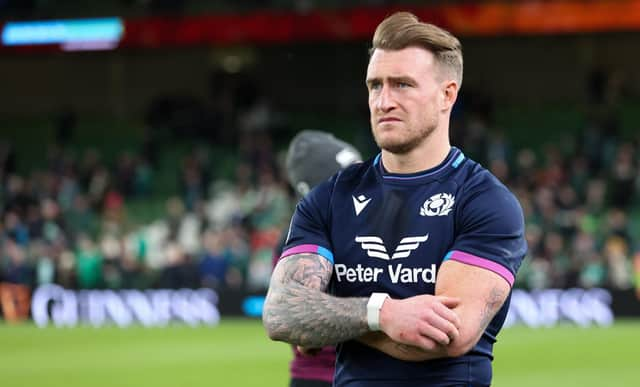The Scotland captaincy matters - why I'm not sure we need to change it


There was some surprise – also criticism – when Edinburgh’s new coach Mike Blair moved Kinghorn from his usual position at full-back or wing, all the more so because in the South African born Scotland international Jaco van der Walt Edinburgh already had an accomplished fly-half, adept at controlling the game. But Blair’s judgement has proved good, Kinghorn at 10 playing an important and influential part in what has been Edinburgh’s most impressive season for some time, done it well enough indeed for Gregor Townsend to have selected him at 10 ahead of Finn Russell for Scotland’s last Six Nations match. Moreover, given that Finn and his club Racing 92 may well be engaged in French domestic rugby well into June, it would be no surprise if Kinghorn was at 10 in at least the first match of Scotland’s July three Test tour of Argentina.
Selection for that tour may indeed be influenced by the demands of English clubs as well as Finn’s Paris one. The English Premiership semi-finals and final will not be over till mid-June. If, for instance, Exeter Chiefs are involved right up to the end – though this looks less likely at present than one would have expected a few months ago – would Stuart Hogg, Jonny Gray and Sam Skinner be in need of a break?
Advertisement
Hide AdAdvertisement
Hide AdIt's a difficult question. Even if one is sorry that it is now some time since Scotland ventured to New Zealand or South Africa, Argentina – currently ranked nine in the world – two places behind Scotland, may offer the most suitable challenge to the Scotland squad at its present state of development.
It is 12 years since we played a two Test series there, and won both matches. That was a notable achievement, for it is always hard to win there. It wasn’t however a glittering one, for we scored only one try in the two matches and secured victory thanks to Dan Parks kicking penalties and drop goals. Today’s Scotland team would be expected to be somewhat more adventurous.
The captain then was Al Kellock, a very good lock and a more than good leader. Even though captains now play second fiddle to coaches – and even less than that if the coach is Eddie Jones –
the captain still matters and some might see this tour as the right time to take the arm-band away from Stuart Hogg – something that might anyway be though necessary if Exeter are engaged in the last stages of the English Premiership.
I am far from convinced that a change is needed, even though this Spring’s Six Nations was a bit disappointing. It would he hard to argue that Hogg’s own performance was affected by the captaincy. Indeed, though he made some mistakes, notably squandering an excellent scoring chance against Ireland, in other respects he had a good tournament, for instance being more secure under the high ball than he has been in the past.
Captains come in all forms, all shapes and sizes. Hogg as a captain recalls Andy Irvine, a player who could inspire his team by doing the remarkable or extraordinary. All the same, though there are many examples of successful leadership from the full-back position, I have always thought that ideally the captain should be nearer the action, either a forward or the scrum-half. The most successful Scotland team have been led by a forward, many successful French and Australian teams by the scrum-half – France’s Antoine Dupont today, Australia’s Nick Farr-Jones and Will Genia in the past. In the end, however, it comes down to character. A captain doesn’t have to be loved – though some are – but he must command respect, not only as a player but as a person. In professional club rugby it is now fashionable to shift the captaincy around, but the captain of the national team must be recogniSed as Mr Scotland whenever he takes the field. And this is possible whatever the number on his jersey, though, mindful of 1984 and 1990 Grand Slams there is clearly something to be said for the captain wearing a jersey which proclaims that he is No 1.